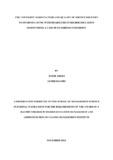The University based factors and quality of service delivery to students living with disabilities in higher education institutions: A case of Kyambogo University
Abstract
The study investigated the university based factors and quality of service delivery to students
living with disabilities at Kyambogo University. The study was based on the following research
objectives; to establish the extent to which accessibility contributes to the quality of service
delivery to the disabled students at Kyambogo University, to establish the extent to which
curriculum has contributed towards quality of service delivery to disabled students at Kyambogo
University and to establish the extent to which staff capacity contributes towards quality of
service delivery to the disabled students‟ at Kyambogo University. The study employed a case
study design and both quantitative and qualitative approaches. In total, a sample of 125
respondents was chosen who included administrators, technical staff, non technical staff and
disabled students. The data collection methods used were questionnaires and interviews. Data was
analyzed using Pearson correlation coefficient and regression analysis. The study findings
revealed that there is a positive significant relationship between accessibility and quality of
service delivery, there is a positive significant relationship between curriculum and quality of
service delivery and lastly staff capacity and quality of service delivery to students with disability
in KYU is positively significantly related. It was concluded that: (i) Kyambogo University still
has a problem given the fact that some buildings are not accessible to students with disabilities.
Some students have not been able to access information given the delay in feedback, and also
some information put on notice boards is not accessible given the fact that notice boards are
crowded all the time. Some of the vital information on notice boards is removed before the PWDs
can access it. Lecturers are conducted in crowded classes that make it uncomfortable to students
with disabilities to access. (ii) The curriculum does not cater for people with disabilities and needs
to be adjusted; some courses have contents that don‟t suit the PWDs in this sense. The lecturers
use a style of teaching that does not favor the impaired; the absence of brailles has worsened the
whole situation. (iii) Some of the KYU staff members lack the expertise in handling PWDs and
therefore are not trained on how to deal with students with disabilities.. The students complained
of not receiving enough guidance from lecturers. It was recommended that (i)There is need to
improve on the infrastructure (roads, buildings) electronic devices (modern ones e.g internet
services with jaws programmes for the blind, buildings with loop systems for the deaf. KYU
should employee the visual impaired person responsible for braille Many times the students meet
the costs of the services rendered to them by guides and interpreters. (ii) The curriculum should be
adjusted to suit some learners with visual impairments by removing some contents in the courses
taught that don‟t favor the visually impaired. (iii) Lecturers should get sufficient training on how
to handle and deal with the PWDs in class. And lastly, there is need to train the staff on how to
handle students with disabilities. Staff training on overall school inclusion plan should be high on
the list of needs as well.

